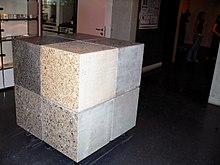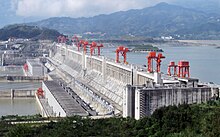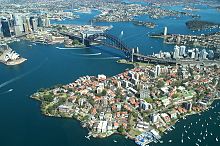Orders of magnitude (one cubic metre to one cubic kilometre)
Appearance
This article needs additional citations for verification. (July 2016) |
It has been suggested that this article be merged into Orders of magnitude (volume). (Discuss) Proposed since February 2016. |
The following is a table of objects with volumes or capacities of between one cubic metre and one cubic kilometre.







| volume (m3) | example |
|---|---|
| 1×100 | one cubic metre, one kilolitre or one stère—volume of a large domestic fridge-freezer (external dimensions) |
| 3.85×101 | external volume a standard 20-foot ("TEU") cargo container, which has a capacity of 33.1 thousand cubic metres |
| 7.7×101 | external volume a standard 40-foot ("FEU") cargo container, which has a capacity of 67.5 thousand cubic metres |
| 1.05×102 | volume of a rear-engine Leyland Titan London double-decker bus |
| 1.49×102 | volume of any A Division New York City Subway car |
| 1×103 | one cubic decametre or one megalitre |
| 1.233×103 | one acre-foot |
| 2.5×103 | volume of an Olympic size swimming pool of minimal depth (50 m × 25 m × 2 m). |
| 3.054×103 | volume of each of the nine spheres of the Atomium in Brussels |
| 1.13×104 | gas volume in the first zeppelin LZ 1 |
| 1.1866×104 | amount of concrete in Trbovlje Chimney |
| 1.56×104 | Quebec's 2001 output of maple syrup |
| 5.0×104 | typical volume of a large gasometer |
| 8.5–9.9×104 | volume of the Royal Albert Hall auditorium[1] |
| 1.84×105 | volume of gas in the USS Macon (ZRS-5) zeppelin |
| 2.11890×105 | volume of gas in the Hindenburg zeppelin |
| 6.50×105 | volume of crude oil that can be carried aboard the Knock Nevis supertanker |
| 9.66×105 | volume of Taipei 101's gross floor space[2] |
| 1×106 | one cubic hectometre, one gigalitre or one kilostère |
| 1.4×106 | volume the 1910 Lakeview Gusher oil spilt (the biggest oil gusher in US history) |
| 1.5644×106 | volume of concrete in the Panama Canal Locks |
| 2.6006×106 | volume of stone in the Great Pyramid of Giza |
| 3×106 | approximately amount of mud and clay that slid into the South Nation River valley as a landslide on 20 June 1993 |
| 3.33×106 | volume of concrete in Hoover Dam |
| 3.664883×106 | volume of the NASA's Vehicle Assembly Building |
| 8×106 | volume of chalk excavated in the construction of the Channel Tunnel |
| 1×107 | volume of Chagan Lake, artificial lake created by nuclear explosion |
| 1.7×107 | volume of material in the Gatun Dam, completed in 1913 |
| 2.8×107 | volume of concrete in the Three Gorges Dam, the world's largest concrete structure |
| 4.3×107 | volume of Aswan Dam |
| 9×107 | volume of gas required per day by India in 2005 |
| 1.01×108 | volume of the Grimsel reservoir |
| 1.73×108 | volume of Lake Baldegg, Switzerland |
| 2.05×108 | volume of material excavated in the construction of the Panama Canal |
| 2.2×108 | volume of Lac de la Gruyère, Switzerland |
| 2.85×108 | volume of Lake Halwill, Switzerland |
| 3.20–3.35×108 | volume of the Great Wall of China |
| 3–5×108 | volume of all humans alive on the planet (based on an average mass of 40–70 kg per human) |
| 4×108 | predicted volume of natural gas required per day by India in 2025 |
| 5×108 | one sydharb—volume of Sydney Harbour, Australia[3] |
| 6.93×108 | volume of Lake Murten, Switzerland |
| ← one cubic millimetre to one cubic metre one cubic kilometre to one cubic megametre → | |
References
- ^ Atwood, Robert (2006). Bears Can't Run Downhill, and 200 Dubious Pub Facts Explained. Ebury Press. p. 124. ISBN 0-09-191255-5.
- ^ 198000 square metres floor space from Structurae multiplied by the "Slab to Slab Height" of 4.20 metres from taipei-101.com.tw gives 831600 cubic metres. Floors one to eight can be approximated as 4300 square metres (from [1]) times 8 times 4.2 metres, or an additional 134400 cubic metres, giving an estimated 966000 cubic metres.
- ^ "Australian Conventional Units of Measurement in Water" (PDF). Australian Water Association. Archived from the original (PDF) on 30 October 2005. Retrieved 10 March 2006.
